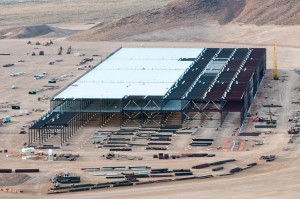Occasionally I hear criticisms of the electric vehicle push that we are simply replacing one limited resource (oil) with another (lithium and other raw materials for EV batteries).
Yet knowledgeable people seem to indicate that the resource issue isn’t real and that plenty of materials exist to power the world over with batteries.
Now Bloomberg reports on Tesla’s efforts to lock up the raw materials it needs for its big battery push, with the potential for competition from international actors who also need batteries for their consumer products:
For its batteries, Tesla typically uses formulations including lithium, nickel, cobalt, and aluminum oxide. To find a steady and affordable supply of these materials—key to keeping the base price of the Model 3 at about $35,000—the company is recruiting staffers to scour the globe. It hired Rene LeBlanc, a former engineer at FMC Lithium, earlier this year. It’s also looking for a Tokyo-based supply-chain analyst willing to travel frequently to China and South Korea to work closely with suppliers.
Despite all the buzz about lithium, Musk reminded investors at Tesla’s May 31 shareholder meeting that the metal is “just the salt on the salad,” accounting for only about 2 percent of the material in Tesla cells. Yet it’s key to making batteries rechargeable, and even that small percentage doesn’t exempt Tesla from the laws of supply and demand. It’s competing for the metal with companies in Asia, where China, Japan, and Korea account for more than 85 percent of current lithium ion battery output, according to researcher CRU Group.
This race for resources will likely spur innovation, as Tesla is already trying to swap out more expensive cobalt for nickel, and battery innovation could change the chemical and metallic needs of future batteries.
But it’s an interesting dynamic to track, as it ultimately determines the price of the batteries, which determines the price of the vehicles, which determines their popularity to consumers, which determines how quickly we can transition away from oil and stabilize the planet’s climate in the process.
Leave a Reply
You must be logged in to post a comment.



